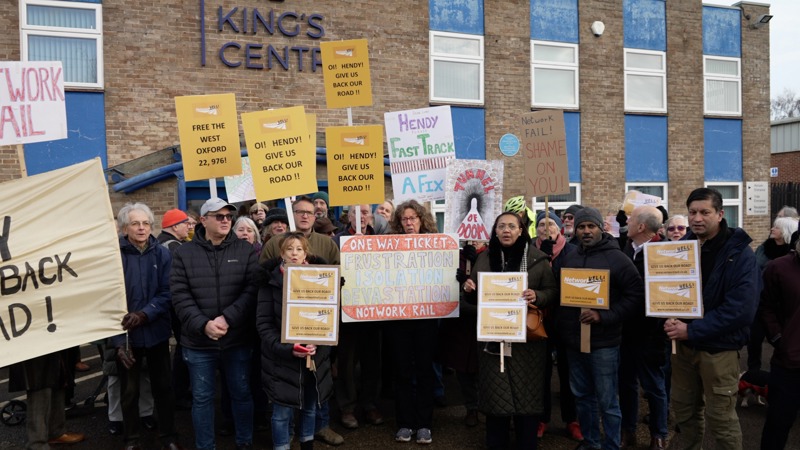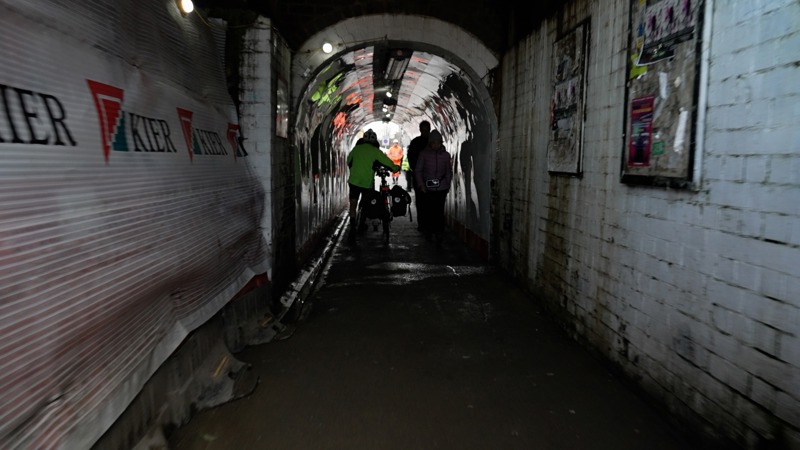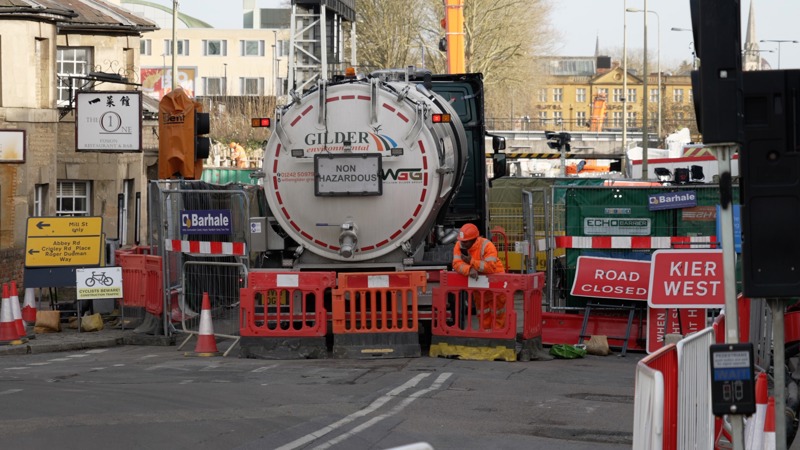
Rail Minister Lord Hendy and Network Rail Chief Executive Sir Andrew Haines have visited Oxford to apologise for the prolonged closure of a main road into the city.

Rail Minister Lord Hendy and Network Rail Chief Executive Sir Andrew Haines have visited Oxford to apologise for the prolonged closure of a main road into the city.
Network Rail has admitted that Botley Road, alongside Oxford station, will not reopen before August 2026, Network Rail has admitted. It had been expected to close for two periods of six months. But the blockade to allow the replacement of a single rail bridge over the road will now last for three and a half years.
Botley Road is the main route into Oxford city centre from the west. Rebuilding the bridge is a key part of a £161 million upgrade to the railway station, as it prepares for the launch of East West Rail services later in 2025. A new station entrance is also being built.
Hendy entered a meeting through a group of 100 placard-waving protesters, escorted by five people whom locals termed “burly security guards” during a visit on January 24.
Network Rail had planned to close the road for six months from April 2023, reopen it, and then close it again for completion in 2024. But it has not reopened at all. Deadlines have repeatedly been pushed back.
Pedestrians have been able to pass through a narrow footpath they have called the “tunnel of doom”.
Local resident Nicky Scott said: “It wears you out. You stop going into town.”
Another, former TV producer John Mair, told RAIL: “It is outrageous. No openness, no transparency. It beggars belief.”

Mair pointed out that the project is taking longer than the far larger rebuild of Junction 10 on the M25, adding that large parts of East West Rail and long tunnels on HS2 were progressing faster and more effectively.
“They are still stabbing in the dark. A catalogue of gross errors that puts public infrastructure projects to shame. Business schools will use this as an exemplar of what not to do.”
Another resident, Vernon Orr, commented: “Older people and people with disabilities have had to funnel through the tunnel of doom. It is a very restricted space with a very uneven footway. A lot of people have given up.”
Local people detail their complaints online at www. networkhell.co.uk, where they also call for an independent inquiry into politicians, rail organisations and construction companies that are “impersonal, incompetent, unfeeling and just plain wrong”, because they do not heed the needs and daily lives of those affected.
Network Rail has promised a larger passageway through the work will open in the summer. It said: “24/7 security marshals are in place to patrol the pedestrian tunnel, offering support to those who need it.”
In the meantime, the roadblock - right in the middle of Oxford - will continue for a further year and a half.
Business owner Lula Kinnaird said: “We have staff to pay. We have rent to pay. We have business rates to pay. It is very stressful.”
Tom Rainey, who owns The Porter House restaurant and hotel, and The Punter pub, said takings were 10% down.
“It means a lot less hiring of staff - a lot less hours for the staff. But your overheads are staying the same. It really means losses for the business.”
He suggested that businesses should have a grant similar to payments compensating bus operators for loss of revenue during COVID.
Oxford West and Abingdon MP Layla Moran said after the meeting that locals had lost all faith in Network Rail’s promises.
She called for compensation for affected businesses, warning: “If they don’t do this soon, then we won’t have local businesses left - particularly the small independent ones. They may not survive the next few months, let alone the year and a half we are looking at.”

Moran acknowledged that the station redevelopment was “essential” and that a fifth platform would bring “real long-term benefits to the city”, adding: “Without it, proposals to reopen the Cowley Branch to passengers, or increase the capacity on East West Rail services, will not be feasible.”
The project has been delayed by problems moving utilities which shared the road beneath the railway at the southern end of Oxford station.
NR said the revised timeline would deliver “the necessary utility diversions” and avoid cutting the water supply and sewerage to 60,000 homes.
An upgraded flood defence system will now form part of the work. It includes a new concrete layer to keep out rising ground water, a new pumping system, and
retention tanks for surface water. Network Rail avoided answering questions on the final cost. Haines told the meeting he could not confirm that the overspend exceeded £100m. Local sources suggested an extra £40m will be needed for moving utilities and services.
Marcus Jones, Route Director for NR’s Wales and Western Region, said: “We are working with the Department for Transport to make sure we have the funding in place. We are confident we have a plan that will deliver. We’ve had a dozen agencies working together to develop this.”
He added: “Our review has scrutinised every aspect of the programme.”
After the meeting, Hendy said: “We have agreement for funding for the finished work. It’s obviously completely undesirable that these things should cost more than people imagined. Many schemes don’t, but here we are with one that does. The Treasury have signed off the money to finish this work.”
Local resident, Baroness Ruth Deech was unimpressed: “My professional life and my personal life have been absolutely devastated for nearly two years. The utter lack of sympathy by Network Rail to enable elderly people, pregnant people or sick people to get into town. They can’t even get to the doctor. It’s a £70 return taxi fare to reach the hospital.
“The Minister had to barricade himself inside this meeting place with bodyguards, to stop people getting in to hear what is going on. This tells you everything you need to know about Network Rail.
“These works are a complete failure. They don’t seem to know what they are doing. Network Rail has failed in its legal duty to make reasonable adjustments for disabled people. The Minister was the chair of Network Rail. This started on his watch.”
Login to continue reading
Or register with RAIL to keep up-to-date with the latest news, insight and opinion.

















Login to comment
Comments
No comments have been made yet.